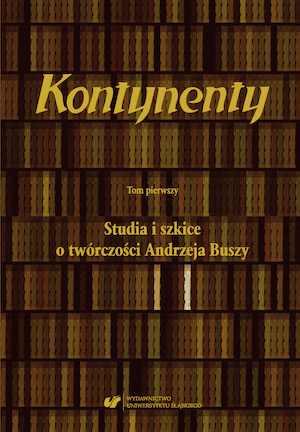Czytając angielskie wiersze Andrzeja Buszy
Reading Andrew Busza’s English Poems
Author(s): Ross Labrie
Subject(s): Polish Literature
Published by: Wydawnictwo Uniwersytetu Śląskiego
Keywords: Andrzej Busza; English poetry; literary tradition;
Summary/Abstract: Beginning on a personal note: how he enjoyed the friendship of both Andrew Busza and Bogdan Czaykowski for many years, Ross Labrie relates an occasion when Busza confessed to him some uneasiness about being a poet who is a cultural and linguistic hybrid. In response, Labrie suggested that being such a hybrid is probably the clearest indication of following a distinct path. Moreover, in his opinion, Busza’s English demonstrated a meticulous sensitivity to English idioms and rhythms, as well as a profound knowledge of the English literary tradition, acquired first as a student and then deepened as a teacher of literature. The focus of Labrie’s essay are poems by Busza in the volume Full Moon and Summer Solstice (Toronto, 2008), containing his own poems and those of Czaykowski in Polish and English versions. In addition to analyzing Busza’s poems, Labrie relates them to some major poetry movements in England and America. Like other twentieth‑century modernist poets, Busza is clearly indebted to William Carlos Williams and imagism. Although just as Wallace Stevens, he enriches the imagist technique to evoke deeper levels of perception, Busza does not share Stevens’ romanticism and implicit pantheism. Comparatively speaking, Busza’s poems are fundamentally rational. Though religious and metaphysical concerns are central to his work, unlike the romantics, he does not confer on the imagination mystical knowledge. He shares this restraint with the writings of such high modernists as Eliot and Pound. Busza also follows the practice of high modernists in their frequent recourse to symbol and allusion in an effort to enhance the authority of poetry. He is a poet steeped in the culture of Western civilization, though not attracted to the sophisticated mundanity of postmodernism and its ramifications (a stance some will deem quixotic), who has consistently taken the high ground.
Book: Kontynenty. T. 1: Studia i szkice o twórczości Andrzeja Buszy
- Page Range: 57-72
- Page Count: 15
- Publication Year: 2019
- Language: English, Polish
- Content File-PDF

